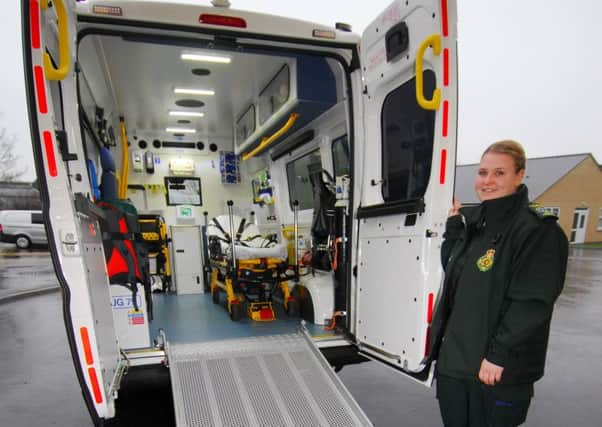Helping speed up ambulance response times


According to East Midlands Ambulance service, its new Urgent Care Transport Service, which went live on April 3, is designed to reduce delays for patients, and reduce the pressure faced by emergency staff leading to faster response times.
Thanks to increased funding, the service has recruited 100 Urgent Care Assistants (UCA’s), with 25 of them based in Lincolnshire at Sleaford, Market Rasen and Grimsby, using vehicles which are not equipped with blue lights to cut through traffic.
Advertisement
Hide AdAdvertisement
Hide AdThe service aims to provide transport to patients requiring urgent admissions to hospital, as determined by their GP or other healthcare professionals such as a community paramedic in a response care at the scene. They ferry patients requiring transport that do not need ongoing emergency treatment from a technician or paramedic, having been assessed at the scene. They will also transfer patients between hospitals that would normally have unnecessarily used a ‘blue-light’ ambulance.
The UCA’s have not been trained to drive on blue-lights. The crews had been using hired vehicles but now have purposely equipped ones in place.
Since the implementation, response times have improved. Lincolnshire has seen 2,599 transfers to hospital, freeing up the same number of frontline ambulance trips to attend life threatening calls, explains ambulance operations manager Paul Litherland.
In March, the average waiting time for an urgent transfer was 10 hours 43 minutes. Since the Urgent Care teams have been in place the average wait in April reduced significantly to 4 hours 30 minutes and reduced further to four hours 10 minutes in October.
Advertisement
Hide AdAdvertisement
Hide AdMr Litherland said originally the UCAs were expected to cover at least four calls a day, but they have been averaging five to seven jobs a day. In only around two per cent of cases the crews have then called a paramedic assistant if a patient has deteriorated, thanks to accurate assessment prior to transit.
He said: “It is a really positive step forward for the Trust and it is having an impact on the categories of call with improved 999 response times by five minutes in Lincolnshire, which is a huge improvement.
He added: “This makes perfect sense because you don’t need paramedics on lower category calls. We are getting UCAs progressing through the service and going on to be technicians and paramedics of the future.”
UCA Hannah Craig has been based at Sleaford since May after six weeks of training with administering things like oxygen, previously working as a nursery nurse as well as being a St John Ambulance volunteer.
Advertisement
Hide AdAdvertisement
Hide AdShe said it was really making a difference: “We get called to a lot of elderly patients with infections, hip problems and dehydration.”
Neil White, Transformational Delivery Manager said: “Our new Urgent Care Transport Service colleagues are an important, integral part of our accident and emergency service.
“We have already seen a positive benefit for patients with the average wait for admission reducing by half. The service has been embedded as part of our operating model and the addition of further Urgent Care Assistants means we can reach more patients allowing our frontline A&E crews to focus on our response to immediately life threatening 999 calls.”